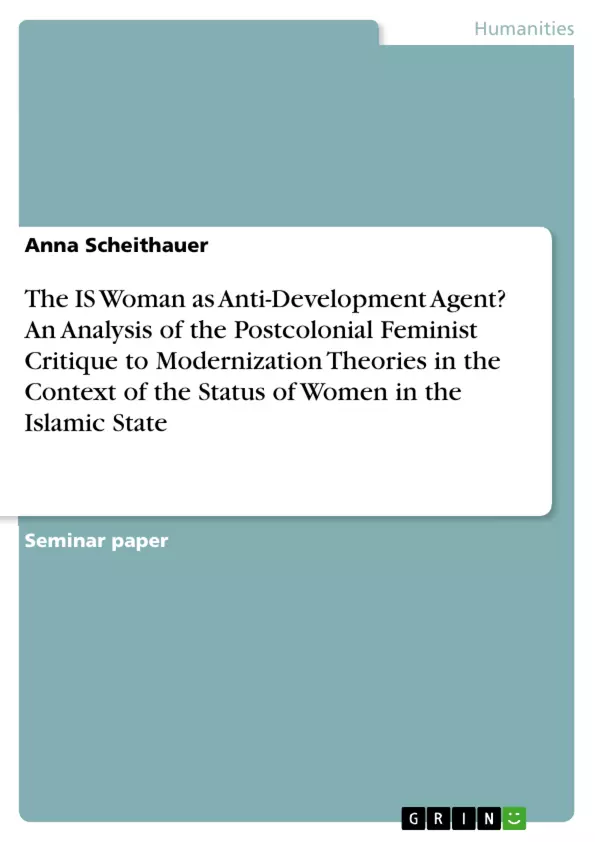This paper is set out to explore the nexus of development and gender equality from a critical perspective on the postcolonial feminist critique to modernization theories. It, thereby, focuses on the status of women in the Islamic state (IS) shedding light on the points of contention between the postcolonial feminist perspective on development and the liberal feminist perspective, yet adding a further dimension to the debate – namely the issue of non-development. This derives from the thesis that the actions by IS women stand in opposition to modernization theories and development theories in general, and that IS women were not only victims in need of aid but also perpetrators. The paper will, thus, answer the question in how far IS woman can be considered anti-development agents by reflecting on gendered barriers to development as well as on drivers of female agency identified in the Islamic State's manifesto on women and the IS online magazines Rumiyah and Dabiq, and by comparing and contrasting them with the postcolonial feminist critique to modernization theories.
Inhaltsverzeichnis (Table of Contents)
- Introduction
- The Gendered Barriers to Development
- "Western" Femonalism
- IS Gender Apartheid
- Constructed Differences
- The Drivers of Female Agency
- Conclusion
- Bibliography
Zielsetzung und Themenschwerpunkte (Objectives and Key Themes)
This paper aims to explore the relationship between development and gender equality through a critical examination of the postcolonial feminist critique of modernization theories. It specifically investigates the role of women in the Islamic State (IS) as it relates to development and its challenges.
- Postcolonial feminist perspectives on development
- The role of women in the Islamic State (IS) and their relationship to development
- Gendered barriers to development in the context of the IS
- The drivers of female agency within the IS
- The concept of non-development and its implications
Zusammenfassung der Kapitel (Chapter Summaries)
- Introduction: This chapter sets the stage for the paper, introducing the research question and outlining the theoretical framework. It also highlights the importance of considering the IS woman's perspective on development and the challenges she faces.
- The Gendered Barriers to Development: This chapter examines the various barriers that prevent women from achieving full participation in development, focusing on the perspectives of "Western" femonalism, IS gender apartheid, and the construction of gender differences.
- The Drivers of Female Agency: This chapter explores the factors that contribute to women's agency within the IS. It examines how women navigate their roles and make choices within the context of the IS's ideology and practices.
Schlüsselwörter (Keywords)
The paper explores the complex relationship between development, gender equality, and the Islamic State, employing key concepts such as postcolonial feminism, modernization theories, gendered barriers, female agency, non-development, and the status of women in the Islamic State.
Frequently Asked Questions
What is the main thesis regarding women in the Islamic State (IS)?
The paper argues that IS women should not be viewed solely as victims but also as perpetrators whose actions stand in opposition to traditional modernization and development theories. They are analyzed as "anti-development agents."
How does postcolonial feminism critique modernization theories?
Postcolonial feminism critiques modernization theories for being Eurocentric and failing to account for the unique historical and cultural contexts of non-Western women. It challenges the assumption that "Westernization" is the only path to development and gender equality.
What are "gendered barriers to development" in the context of IS?
The paper examines barriers such as "IS gender apartheid" and the construction of rigid gender differences that limit women's roles to the private sphere, contrasting this with Western liberal feminist perspectives.
What sources are used to analyze female agency within the Islamic State?
The analysis is based on primary sources including the IS manifesto on women and the group's online magazines, such as "Rumiyah" and "Dabiq," which outline their ideological expectations for women.
What is meant by the concept of "non-development"?
Non-development refers to a state or ideology that actively rejects the goals and processes of global development frameworks, often prioritizing ideological or religious purity over economic and social progress as defined by international standards.
What is the difference between liberal and postcolonial feminist perspectives in this study?
Liberal feminism often focuses on individual rights and legal equality based on Western models, while postcolonial feminism looks at how power structures, colonial history, and cultural identity shape the agency and choices of women in the Global South.
- Quote paper
- Anna Scheithauer (Author), 2022, The IS Woman as Anti-Development Agent? An Analysis of the Postcolonial Feminist Critique to Modernization Theories in the Context of the Status of Women in the Islamic State, Munich, GRIN Verlag, https://www.grin.com/document/1192589



